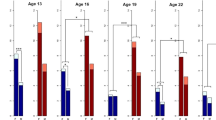Abstract
We examined maternal and paternal perceptions of social competence in children and adolescents. One hundred forty-seven parents rated scenarios depicting children who varied in age, gender, and social competence. Parents also completed questionnaires assessing the amount of time they spend with their own children, their gender identity, their psychological symptoms, and their affectivity. Results indicated that the amount of time parents spend with their own children was related to maternal and paternal ratings, whereas affectivity was related to paternal ratings. In contrast, parents’ gender identity and psychological symptoms were unrelated to their ratings of social competence. Finally, there was an interaction between parent gender and the level of social competence depicted in the scenarios they rated, suggesting that there were differences in maternal and paternal ratings. These findings emphasize the importance of examining the perceptions of both mothers and fathers when assessing social competence in children and adolescents.
Similar content being viewed by others
References
Achenbach, T. M., McConaughy, S. H., & Howell, C. T. (1987). Child/adolescent behavioral and emotional problems: Implications of cross-informant correlations for situational specificity. Psychological Bulletin, 101, 213–232.
Bem, S. L. (1974). The measurement of psychological androgyny. Journal of Consulting and Clinical Psychology, 42, 155–162.
Bonney, J. F., Kelley, M. L., & Levant, R. F. (1999). A model of fathers’ behavioral involvement in child care in dual-earner families. Journal of Family Psychology, 13, 401–415.
Derogatis, L. R., & Spencer, P. M. (1982). The Brief Symptom Inventory (BSI): Administration, scoring, and procedures manual. Towson, MD: Clinical Psychometric Research.
Duhig, A., Renk, K., Epstein, M. K., & Phares, V. (2000). Interparental agreement on internalizing, externalizing, and total behavior problems: A meta-analysis. Clinical Psychology: Science and Practice, 7, 435–453.
Epkins, C. C. (1996). Parent ratings of children's depression, anxiety, and aggression: A cross-sample analysis of agreement and differences with child and teacher ratings. Journal of Clinical Psychology, 52, 599–608.
Fergusson, D. M., Lynskey, M. T., & Horwood, L. J. (1993). The effect of maternal depression on maternal ratings of child behavior. Journal of Abnormal Child Psychology, 21, 245–269.
Harter, S. (1985). Manual for the self-perception profile for children. Denver: University of Denver.
Harter, S. (1988). Manual for the self-perception profile for adolescents. Denver: University of Denver.
Hollingshead, A. B. (1975). Four factor index of social status. Unpublished manuscript, Yale University.
Jacobs, J. E., & Eccles, J. S. (1992). The impact of mothers’ gender-role stereotypic beliefs on mothers’ and children's ability perceptions. Journal of Personality and Social Psychology, 63, 932–944.
Kupersmidt, J. B., & Coie, J. D. (1990). Preadolescent peer status, aggression, and school adjustment as predictors of externalizing problems in adolescence. Child Development, 61, 1350–1362.
LaGreca, A., & Lemanek, K. (1996). Assessment as a process in pediatric psychology. Journal of Pediatric Psychology, 21, 137–151.
Lamb, M. E., Pleck, J. H., Charnov, E. L., & Levine, J. A. (1985). Paternal behavior in humans. American Zoologist, 25, 883–894.
Lytton, H., & Romney, D. M. (1991). Parents’ differential socialization of boys and girls: A meta-analysis. Psychological Bulletin, 109, 267–296.
McBride, B. A., & Mills, G. (1993). A comparison of mother and father involvement with their preschool age children. Early Childhood Research Quarterly, 8, 457–477.
Parker, J. G., & Asher, S. R. (1987). Peer relations and later personal adjustment: Are low accepted children at risk? Psychological Bulletin, 102, 357–389.
Phares, V., Compas, B. E., & Howell, D. C. (1989). Perspectives on child behavior problems: Comparisons of children's self-reports with parent and teacher reports. Psychological Assessment, 1, 68–71.
Renk, K., & Phares, V. (2004). Cross-informant ratings of children's social competence. Clinical Psychology Review, 24, 239–254.
Seiffge-Krenke, I., & Kollmar, F. (1998). Discrepancies between mothers’ and fathers’ perceptions of sons’ and daughters’ problem behaviour: A longitudinal analysis of parent-adolescent agreement on internalising and externalising problem behaviour. Journal of Child Psychology and Psychiatry and Allied Disciplines, 39, 687–697.
Tarullo, L. B., Richardson, D. T., Radke-Yarrow, M., & Martinez, P. E. (1995). Multiple sources in child diagnosis: Parent-child concordance in affectively ill and well families. Journal of Clinical Child Psychology, 24, 173–183.
Watson, D., Clark, L. A., & Tellegen, A. (1988). Development and validation of brief measures of positive and negative affect: The PANAS scales. Journal of Personality and Social Psychology, 54, 1063–1070.
Acknowledgments
This manuscript is based on the dissertation of the first author under the direction of the second author. Special thanks to the mothers and fathers who participated in this study.
Author information
Authors and Affiliations
Corresponding author
Rights and permissions
About this article
Cite this article
Renk, K., Phares, V. Maternal and Paternal Perceptions of Social Competence in Children and Adolescents. J Child Fam Stud 16, 98–107 (2007). https://doi.org/10.1007/s10826-006-9071-8
Published:
Issue Date:
DOI: https://doi.org/10.1007/s10826-006-9071-8




